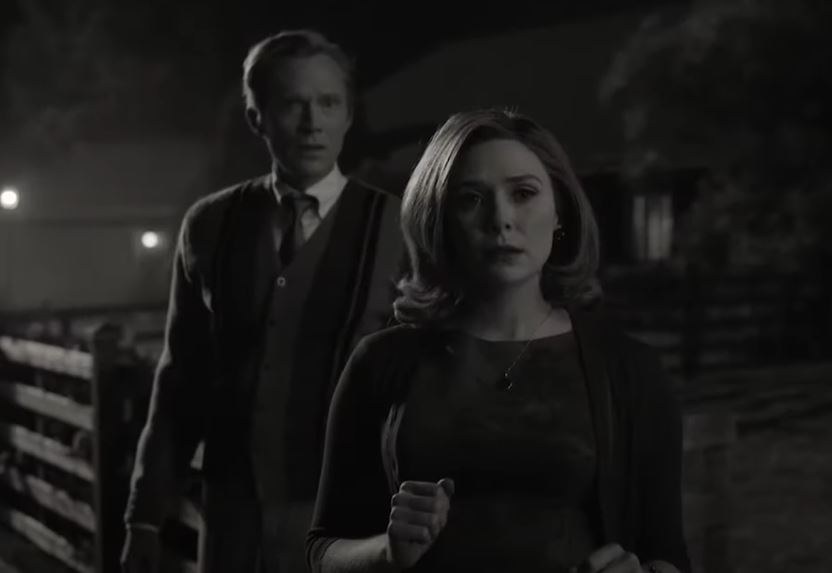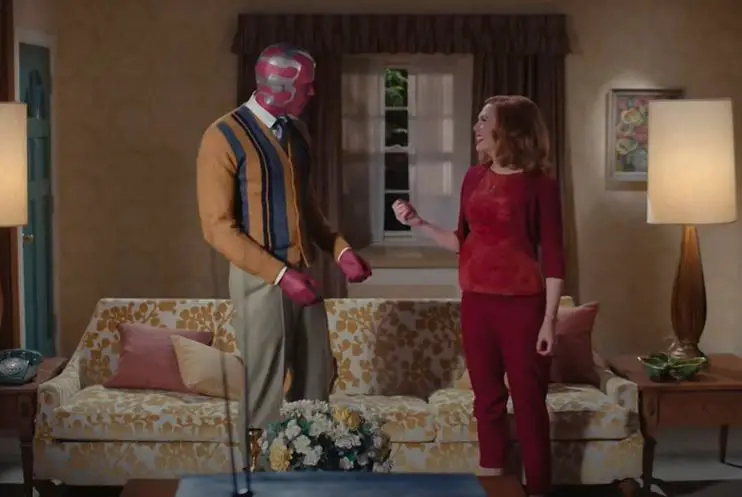I clicked play on WandaVision with no real idea what to expect. I had seen one trailer I do not remember. There were previews involving some kind of black-and-white, old-school sitcom concept. The timeline remained a mystery. Everything about the show was a complete mystery to me.
Now, after two episodes, everything is still a mystery. Two episodes of WandaVision did little to enlighten me as to what in the world I am watching. I still don’t know why there is a sitcom setup or who has planted Wanda and Vision in this reality. I cannot say that Vision really exists here. I am not even sure how good the show really is or will be.
Right now, I could not care less. WandaVision’s premiere episodes were remarkably fun, and I want more. They were the most unique concept I have ever seen from the MCU and exactly the breath of fresh air Marvel needed as it prepares to launch the next phase of its colossally successful live-action empire.

Both episodes work as a spoof of the Bewitched concept, with Vision as the working husband who suffers from misfortunes that Wanda’s magic helps fix. They are still exactly who they were in the movies. Vision has to hide that he is a robot, while Wanda has to hide her powers. Their struggles to do so place them in classic conundrums involving talent shows and dinner with the boss, with flying lobsters and literal gummed up innards.
In that way, it reminds me somewhat of the movie Pleasantville, yes, and Pleasantville is an easy comparison to make. I think that major difference of Wanda and Vision being unaware that they do not belong makes the whole concept better than that movie, though.
I was not sure what direction WandaVision would go with this sitcom spoof concept, but thankfully they played it completely straight. There is no mean-spirited mocking of these classic shows, and no attempt to apply any realistic, modern twist to them. Wanda and Vision have a bit of a fish out of water feeling, as neither seems to understand basic concepts about their surroundings, but there is little focus on whether they belong or not, because they think they do. They only hide their powers, so it feels more like Samantha in Bewitched.
WandaVision plays as a loving tribute to some of the original classics of television, with any mocking of the concept purely out of love and respect for how they paved the way.
I am a bit shocked about how well this type of humor held up in these episodes. My biggest fear was that it would feel dated the way actually going back and watching something like Bewitched or The Addams Family does. I did not feel that way at all. These episodes are simply too much fun to not be entertained by. The actors are clearly having too much fun to not enjoy myself alongside them. They play right into the earnest joy of the episodes.
The second episode, involving a neighborhood talent show, really shows this fun at its peak. Vision accidentally swallows a piece of gum, which messes with his machinery, and basically causes him to act drunk. Paul Bettany is an absolute delight in this scene as he loses the inhibition to hide her powers and Wanda uses her own to cover for him. The whole show might have been worth it just for the magic act at the talent show.
As fun as all this is, the intrigue of why Wanda and Vision are in this setting and how they got there definitely helps keep you interested through the sitcom shenanigans.
These world-breaking scenes suggest that Wanda is at least subconsciously aware that she and Vision do not belong, and that she may have placed herself into this state willingly. The end of the first episode reveals it to be some kind of dream/coma state that someone is monitoring, and we find out in episode 2 that the organization monitoring is SWORD, Marvel’s cosmic equivalent to SHIELD. I’ll be honest, I have no idea about SWORD or Mephisto or any of the other theories running around.
I love the obvious interpretation that this mental state is Wanda’s way of coping with the trauma of Vision’s death in Infinity War. In many ways, WandaVision reminds me of Legion, with a main character creating a world within their head that protects them from a trauma they do not want to face. Like with Legion, WandaVision packs episodes with all kinds of symbolism and metaphors and cracks in the dream state that threaten to reveal the truth.
I have seen some of the many things I missed, and I love it. There was a lot of effort put into telling this story.

WandaVision handles these cracks in the façade with sudden changes in camera work that I barely noticed until the scenes hit their peaks. The episodes stick rigidly to your typical single-camera sitcom direction, but then something like Vision’s boss choking or the “beekeeper” at the end of episode 2 happens and it shifts to a more modern multi-camera drama style. It is an effective way to represent the seeming threat to Wanda’s presumed mental state.
Each of the first two episodes take cue from a different era of sitcom television. The end of episode 2 sees the “world” go from black-and-white to color, and with it seemingly yet another shift into a new era of television. I am not sure how long this will last, or if each episode will just keep advancing into a new era, but either way I am having a great time watching it.
As much as a fan as I am of the MCU, this was a desperately needed fresh start for Marvel’s Disney Plus venture. Picking the show to launch all the shows they have planned had to be a tough choice, as did the direction to go with them. I have no idea what the overall reaction to WandaVision will be, or whether it will pick up the audience everyone hopes for, but I am glad they did something this different.
There is always a risk to mystery box shows like this one, where you hope audiences can both understand the weirdness and enjoy it. There is a risk for the audience as well since you do not know which aspects of the mystery box will be revealed and whether you will feel satisfied in the end. Legion was a fun, high quality show, but it never picked up the audience it deserved. Mr. Robot also does something similar with the unreliable narrator in an unreliable world, and was practically ignored after a somewhat popular first season.
Hopefully WandaVision succeeds and does not scare Marvel away from more risks like this.
TV is easier to justify unexpected directions and bold risks than movies are. Marvel has tried some different moves with different directors in its movies, but they still tend to adhere to a formula. It is what it is. Marvel chose their path and they have been wildly successful.
By choosing WandaVision as the debut for their TV venture, it looks like they may be willing to take greater risks here. Whether WandaVision sees this project through smoothly or stumbles moving forward ultimately should not matter. Anything outside of a complete disaster should mean more efforts like this, where Marvel shows will be a place for something creative and risky rather than a TV version of the movie formula.
Just seeing something so different is already more than enough to make me glad WandaVision exists.
Images Courtesy of Marvel Studios
Have strong thoughts about this piece you need to share? Or maybe there’s something else on your mind you’re wanting to talk about with fellow Fandomentals? Head on over to our Community server to join in the conversation!

